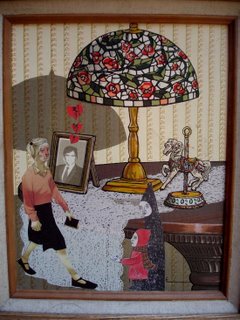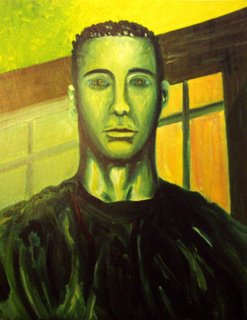
Dada on Film
The Museum of Modern Art
June 24–September 4, 2006
If you happen to be in New York in the coming weeks, be sure to see the Dada exhibit at The Museum of Modern Art. The exhibition ends September 11, 2006. The traveling exhibition has been shown in Zürich, Berlin, Cologne, Hannover, New York, and Paris.
From The Museum of Modern Art’s website: “This major museum exhibition, which premiered at the National Gallery of Art, is the first in the United States to focus exclusively on Dada, one of the twentieth century’s most influential avant-garde art movements. Responding to the disasters of World War I and to an emerging modern media and machine culture, Dada artists led a creative revolution that profoundly shaped the course of subsequent art. Dada was a defiantly international movement, the first to self-consciously position itself as an expansive network crossing countries and continents. Born in neutral Zurich and New York, two cities that served as independent points of origin for the movement, Dada rapidly spread to Berlin, Cologne, Hannover, Paris, and beyond. This exhibition surveys the many forms of Dada artistic production as developed in the movement’s six primary city centers and features over four hundred works in a dynamic multimedia installation that includes collages, films, paintings, photographs, printed matter, sound recordings, and sculpture. Among the nearly fifty artists represented are Hans Arp, Marcel Duchamp, Max Ernst, Raoul Hausmann, Hannah Höch, Francis Picabia, Kurt Schwitters, and Sophie Taeuber, along with a number of less familiar individuals associated with the movement. A publication accompanies the exhibition.
Dada was a provocative and irreverent art movement, founded in Switzerland in the early twentieth century, in which a seemingly chaotic, spontaneous, and pessimistic aesthetic influenced painting, sculpture, theater, literature, and film. The movement’s name is a willfully nonsensical word, intended to punctuate the meaninglessness artists saw in their contemporaneous worldview. Dada filmmakers such as Hans Richter, Man Ray, and Viking Eggeling were challenged by the developing technology of filmmaking in the 1920s. This confluence of technology and aesthetic experimentation suited the Dadaists’ passion for the machine-made object. The visual disruption created by the Dada filmmakers in the 1920s provided a legacy of aesthetic language for the cinematic experiments of future generations of avant-garde artists. The landmark films in this program—all produced between 1921 and 1928—are also on view within the context of other works in other mediums by the same artists in the Dada exhibition on the sixth floor of the Museum. All films are drawn from MoMA’s collection and are silent.”
Organized by Anne Morra, Assistant Curator, Department of Film and Media.
Dada on Film series:
Symphonie Diagonale. 1921. Germany. Directed by Viking Eggeling. 6 min.
Rhythmus 21. 1921. Germany. Directed by Hans Richter. 3 min.
Rhythmus 23. 1923. Germany. Directed by Hans Richter. 3 min.
Le Retour à la raison. 1923. France. Directed by Man Ray. French intertitles. 2 min.
Ballet mécanique. 1924. France. Directed by Fernand Léger. Black-and-white version. French intertitles. 12 min.
Entr'acte. 1924. France. Directed by René Clair. 17 min.
Filmstudie. 1926. Germany. Directed by Hans Richter. 4 min.
Anemic Cinema. 1926. France. Directed by Marcel Duchamp. French intertitles. 6 min.
Emak Bakia. 1926. France. Directed by Man Ray. French intertitles. 15 min.
Vormittagsspuk. 1928. Germany. Directed by Hans Richter. 6 min. Program 74 min.
Saturday, June 24, 3:00; Sunday, June 25, 1:00; Friday, June 30, 7:00. T1.
Saturday, July 1, 1:00; Sunday, August 13, 4:30; Monday, September 4, 6:00. T2
The Museum of Modern Art
(212) 708-9400
11 West 53 Street, between Fifth and Sixth avenues
New York, NY 10019-5497






